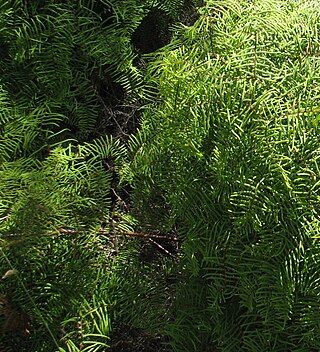
The Percolozoa are a group of colourless, non-photosynthetic Excavata, including many that can transform between amoeboid, flagellate, and cyst stages.

Jasmine is a genus of shrubs and vines in the olive family of Oleaceae. It contains around 200 species native to tropical and warm temperate regions of Eurasia, Africa, and Oceania. Jasmines are widely cultivated for the characteristic fragrance of their flowers. A number of unrelated plants contain the word "jasmine" in their common names.

Kookaburras are terrestrial tree kingfishers of the genus Dacelo native to Australia and New Guinea, which grow to between 28 and 47 cm in length and weigh around 300 g (11 oz). The name is a loanword from Wiradjuri guuguubarra, onomatopoeic of its call. The loud, distinctive call of the laughing kookaburra is widely used as a stock sound effect in situations that involve an Australian bush setting or tropical jungle, especially in older movies.

The Vombatiformes are one of the three suborders of the large marsupial order Diprotodontia. Seven of the nine known families within this suborder are extinct; only the families Phascolarctidae, with the koala, and Vombatidae, with three extant species of wombat, survive.

Juncaceae is a family of flowering plants, commonly known as the rush family. It consists of 8 genera and about 464 known species of slow-growing, rhizomatous, herbaceous monocotyledonous plants that may superficially resemble grasses and sedges. They often grow on infertile soils in a wide range of moisture conditions. The best-known and largest genus is Juncus. Most of the Juncus species grow exclusively in wetland habitats. A few rushes, such as Juncus bufonius are annuals, but most are perennials.

The genus Blarina is a group of relatively large shrews with relatively short tails found in North America. They have 32 teeth and are in the red-toothed shrew subfamily.

Theobroma is a genus of flowering plants in the mallow family, Malvaceae, that is sometimes classified as a member of Sterculiaceae. It contains roughly 20 species of small understory trees native to the tropical forests of Central and South America.

Muscari is a genus of perennial bulbous plants native to Eurasia that produce spikes of dense, most commonly blue, urn-shaped flowers resembling bunches of grapes in the spring. The common name for the genus is grape hyacinth, but they should not be confused with hyacinths. A number of species of Muscari are used as ornamental garden plants.

The lesser blind mole-rat is a species of rodent in the family Spalacidae. It is found in Albania, Bosnia and Herzegovina, Bulgaria, Croatia, Greece, Hungary, North Macedonia, Romania, Serbia, Montenegro, Turkey and Ukraine.

Calosoma is a genus of large ground beetles that occur primarily throughout the Northern Hemisphere, and are referred to as caterpillar hunters or caterpillar searchers. Many of the 167 species are largely or entirely black, but some have bright metallic coloration. They produce a foul-smelling spray from glands near the tip of the abdomen. They are recognizable due to their large thorax, which is almost the size of their abdomen and much wider than their head.

Gleichenia is a genus of ferns. Its closest relative is the genus Stromatopteris, restricted to New Caledonia.

Nebria is a genus of ground beetles native to the Palearctic, the Near East and North Africa. There are more than 500 described species in Nebria.

Carabinae is a subfamily of ground beetles in the family Carabidae. There are about 10 genera and more than 1,400 described species in Carabinae.
Paraperipatus is a genus of velvet worms in the family Peripatopsidae. The number of legs vary within species as well as among species in this genus and can range from as few as 21 pairs up to 27 pairs in males and 29 pairs in females. The maximum number of leg pairs recorded in this genus (29) is also the maximum number of leg pairs found in the family Peripatopsidae. This genus exhibits matrotrophic viviparity, that is, mothers in this genus retain eggs in their uteri and supply nourishment to their embryos, but without any placenta. Species in this genus are found in New Guinea and Maluku, Indonesia.

Kansaignathus is a genus of velociraptorine dromaeosaurid from the Late Cretaceous Ialovachsk Formation of Tajikistan. The genus contains a single species, Kansaignathus sogdianus.

Pogonini is a tribe of ground beetles in the family Carabidae. There are about 12 genera and more than 80 described species in Pogonini. More than half the species are in the genus Pogonus.
UFC on ESPN: Vera vs. Sandhagen was a mixed martial arts event produced by the Ultimate Fighting Championship that took place on March 25, 2023, at the AT&T Center in San Antonio, Texas, United States.
UFC 286: Edwards vs. Usman 3 was a mixed martial arts event produced by the Ultimate Fighting Championship that took place on March 18, 2023, at The O2 Arena in London, England.

UFC 287: Pereira vs. Adesanya 2 is an upcoming mixed martial arts event produced by the Ultimate Fighting Championship that will take place on April 8, 2023, at the Miami-Dade Arena in Miami, Florida, United States.
















